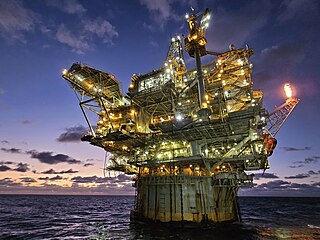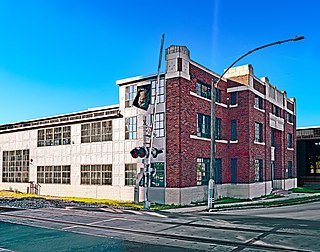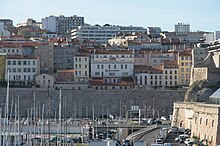
A.P. Møller – Mærsk A/S, usually known simply as Maersk, is a Danish shipping and logistics company founded in 1904 by Arnold Peter Møller and his father Peter Mærsk Møller.

Aker Solutions ASA is a Norwegian engineering firm headquartered in Oslo. The firm's production is focused on energy infrastructure, including systems and services required to de-carbonize oil and gas production, build wind-to-grid infrastructure and engineer CO2 capture and sequestration.

CMA CGM is a French shipping and logistics company founded in 1978 by Jacques Saadé.

Technip S.A. was a company that carried out project management, engineering and construction for the energy industry; in 2017 it completed a merger with FMC Technologies to form TechnipFMC. Its headquarters were in the 16th arrondissement of Paris. It has about 38,000 employees and operates in 48 countries.

Ulstein Group is a group of companies focusing on various marine-related industries, but is mainly known for its shipbuilding and ship design activities. The largest unit is Ulstein Verft AS. The company's head office and primary operations are located in the town of Ulsteinvik in the municipality of Ulstein in Møre og Romsdal county, Norway, an important area for the Norwegian maritime cluster, and with subsidiaries in several other countries. The group also includes companies working with power & control systems, engineering, site follow-up and aftermarket services. The company has also been engaged in shipping.

Subsea 7 S.A. is a Luxembourgish-domiciled subsea engineering, construction and services company serving the offshore energy industry. The company is registered in Luxembourg with its headquarters in London. Subsea 7 delivers offshore projects and provides services for the energy industry.

The Abeille Liberté is an emergency tow vessel based in Cherbourg Harbour, France. It is a sister ship of Abeille Bourbon.

Offshore drilling is a mechanical process where a wellbore is drilled below the seabed. It is typically carried out in order to explore for and subsequently extract petroleum that lies in rock formations beneath the seabed. Most commonly, the term is used to describe drilling activities on the continental shelf, though the term can also be applied to drilling in lakes, inshore waters and inland seas.

RAFO Oneşti was one of the largest oil refineries in Romania and Eastern Europe with an annual total refining capacity of 3.5 million tonnes of oil.

Grup Servicii Petroliere is a Romanian company providing offshore integrated services for oil and gas industry. The company, established in 2004, is a member of UPETROM Group.

An emergency tow vessel, also called emergency towing vessel, (ETV) is a multi purpose boat used by state authorities to tow disabled vessels on high seas in order to prevent dangers to man and environment. The disabled vessel is either towed to a safe haven or kept in place against wind and current until commercial assistance by tug boats has arrived on site or until it has been repaired to the extent of being able to manoeuvre on its own. The need for ETVs as a preventive measure has arisen since the number of available commercial salvage tugs was reduced while potential dangers from individual vessels have increased. E.g. Spain has fourteen, Turkey has eleven, Germany operates eight, Norway has seven, France has five, Sweden three and the Netherlands, Poland, South Africa, Iceland and Finland each have one official emergency tug boat. Australia also operates emergency response vessels. The United Kingdom's four strong ETV fleet was to be disbanded in September 2011 due to budget cuts but the two vessels operating in Scottish waters received an extension of contract until the end of 2011.
Wilson Sons is a Brazilian shipping company headquartered in Rio de Janeiro, Brazil. The firm was set up in Salvador in 1837 by two Scottish brothers, Edward and Fleetwood Pellew Wilson. The firm is one of the oldest private enterprises in Brazil. It was later run by Edward's son, Edward Pellew Wilson Jr.

Qatar Gas Transport Company Limited, commonly known as Nakilat is a Qatari shipping and maritime company. Its LNG shipping fleet is one of the largest in the world, comprising 74 vessels. The company also jointly owns one Floating Storage Regasification Unit (FSRU) and 4 very large LPG carriers (VLGCs). Through its in-house ship management, Nakilat manages and operates the four very large LPG carriers and 14 LNG carriers.
GL Noble Denton is one of the oil and gas businesses of DNV GL, headquartered in Hamburg, Germany and London, UK. The company is an independent technical advisor to industry operators across the world.

Cameron International Corporation (formerly Cooper Cameron Corporation (CCC) and Cooper Oil Tool, Cameron Iron Works) though now operating under Schlumberger, is a global provider of pressure control, production, processing, and flow control systems as well as project management and aftermarket services for the oil and gas and process industries. Cameron was acquired by Schlumberger (SLB) in 2016, and now operates as 'Cameron, an SLB Company.' At the start of the SLB acquisition in 2015, Cameron employed approximately 23,000 people and delivered $9.8 billion in revenue.

EMAS is an offshore contractor and integrated offshore solutions provider catering to the oil and gas (O&G) industry on a global scale. It operates as a subsidiary of Ezra Holdings and has gained recognition within the industry. Established in 1992, the company is headquartered in Singapore and initially focused its operations in the maritime sector of the Asia Pacific region, primarily managing a fleet of vessels. In 2003, the company successfully listed its shares on the Singapore Exchange SGX, enhancing its market presence. EMAS also established fabrication facilities in Vietnam.
DeepOcean is an Oslo, Norway - based company which provides subsea services to the global offshore industries such as Inspection Maintenance and Repair (IMR), Subsea Construction, Cable Lay, and Subsea Trenching. Its 1,100 employees project manage and operate a fleet of Vessels, ROV's and subsea Trenchers.

GE Oil & Gas was the division of General Electric that owned its investments in the petroleum industry. In July 2017, this division was merged with Baker Hughes.
TechnipFMC plc is a French-American, UK-domiciled global oil and gas company that provides services for the energy industry. The company was formed by the merger of FMC Technologies of the United States and Technip of France that was announced in 2016 and completed in 2017.
















